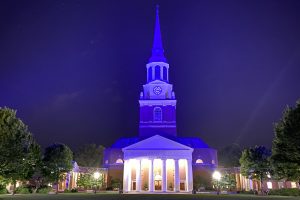By David Gushee
Follow David: @dpgushee
My column this week is anchored by the wise insights of Professor Alan Brownstein, a constitutional law and church-state expert from the University of California at Davis. Professor Brownstein spoke at Mercer University the week of April 6 under the rubric of the Shurden Lectures, co-sponsored by the Baptist Joint Committee on Religious Liberty.
Professor Brownstein, a practicing Jew, spoke with gravity and grace about how Americans ought to think about the cultural, political and legal clashes in our land between religious believers and unbelievers, and between the principles of religious liberty and LGBT equality. More broadly, he spoke movingly of two ways of approaching such situations: winner-take-all vs. seeking common ground. I paraphrase from my notes taken during his riveting lecture.
Dr. Brownstein began by saying there are two kinds of public speech in situations of conflict. Speech can be deployed as a weapon in a power struggle against the threatening “other.” Or speech can be a tool for building bridges and settling disputes between “us” and “them.” In the first case, the goal is essentially to destroy the adversary, using speech as one weapon among many. In the second, the goal is to find workable common ground, based on the recognition of the fellow humanity of the adversary, their real interests and needs, and the pragmatic realization that the “other” is not going away any time soon.
Professor Brownstein strongly urged us listeners to take the second path, for the good of American democracy and in keeping with the best teachings of our religious traditions. (Do unto others ….)
Dr. Brownstein said that if we take that second path, if we attempt to be in dialogue with the “other,” certain ground rules will be necessary for everyone to observe:
• One side must not suggest that the other side does not exist.
• Neither side may trivialize or dismiss the concerns of the other.
• Both sides must acknowledge the costs of “losing” or even of compromise as these are perceived by the other.
• Neither side should define the “other” according to one single characteristic or identity marker.
• Both sides should aim to help each other understand their own experience and perspective using a type of speech that can be heard by the other.
• Both sides should accept the fundamental ground rule of life in a free society: the essence of liberty is the right to be different and to act wrongly in the eyes of others. I think every reader of this column should read that last sentence 10 times before continuing.
Professor Brownstein went on to highlight the fundamental role of fear in situations of public conflict that we end up facing in our culture, politics, and law:
• The fear of being excluded from full participation in public discourse or public life;
• The fear that the other side is trying to coerce change of my side’s core identity;
• The fear that the other side will use the power of law to force my side’s conformity with beliefs and practices that we find abhorrent.
Later he added another point that can be framed as perhaps the most fundamental fear of all:
• The fear of losing or betraying deeply valued relationships of love, either with the Divine or with people, or both.
* * *
Informed by Dr. Brownstein’s brilliant and generous insights, I go off on my own now to offer reflections on the LGBT issue in light of the religious liberty legislation fights in Indiana and Arkansas and the ensuing public reaction.
First, here is my reading of the facts: I believe that the primary purpose of this round of Religious Freedom Restoration Act (RFRA) legislation in various states was to protect traditionalist Christians who run (small) businesses from being sued for refusing service, on conscientious religious grounds, to LGBT persons. Wedding-related services appear to be the primary context in view, but one could imagine others.
And then here’s what happened: Conservative legislatures that easily passed these bills were surprised by the ferocity of the resistance, not just from the LGBT community but also from the behemoths of corporate America (Apple, Walmart, etc.). The power of this public pressure forced these legislatures and governors to quickly modify the legislation in a way that seems to this non-lawyer, and many others, to have gutted the original purpose of the legislation. Here in Georgia, the bill simply melted under corporate and other opposition when everyone had assumed it was on its way to passage. It was a shocking development, and deeply disappointing for its supporters.
Then there were the reverbs: Traditionalist Christians felt deeply alarmed, angered and, in a sense, shamed. I say shamed, not ashamed; and shaming is very powerful and upsetting. The laws, those who favored them, and those states that passed them were shamed, that is, treated as shameful and worthy of opprobrium and social rejection. The array of corporate, political, media, sports, entertainment and other voices standing in iron opposition to this legislation made traditionalist Christians feel marginalized and shamed.
Predictably, those who felt marginalized and shamed reacted vociferously, with social media filled with expressions of outrage. I experienced this personally when, in response to an article by Frank Bruni of the New York Times in which I was quoted, some of the anger came down upon the social media version of my head, mainly for something I did not say. I was going to offer up some of the choicest quotes, but just look over @dpgushee if you want to inflict them on yourself.
Let’s just say it was a deeply dispiriting Easter weekend in social media land.
* * *
So where do we go from here? Can we learn from the principles that Professor Brownstein articulated and find some kind of way forward?
I begin by reiterating that the essence of liberty is the right to be different and act wrongly in the view of others. This right must be honored by others in relation to me and by me in relation to others. And this is true even when an issue feels like a matter of absolute importance to my side, your side, or both sides.
Certainly there will be exceptions, because even such a core principle as liberty is not absolute or unconstrained by other principles. But a free society bends over backward to respect the liberty to be different and act wrongly in the view of others, even if those who march to the beat of a different drummer are a small and disliked minority.
The LGBT issue is an issue that feels like a matter of absolute importance to the most committed on both sides. It raises acute questions about liberty and its limits, because here absolutes indeed clash — and both sides are deeply uncomfortable accepting liberty, as defined above, for the other side.
I assert that the millions of traditionalist Christians who believe that their God/faith requires them to a) maintain the conviction that all same-sex relationships are sinful, and to b) refuse participation in any activity that might compromise that conviction, are entitled to that conviction and to a reasonable (not unlimited) range of actions that follow from it. It is appropriate for those who disagree with them to offer good reasons and to participate in civil dialogues aimed at changing such beliefs and practices, but not to use coercive power to change those beliefs and practices.
I ask in return that the millions of Christians and others who believe that our God/faith requires us to a) abandon the conviction that all same-sex relationships are sinful, and b) participate in activities that we believe end harm against LGBT people and extend them and their relationships full and equal recognition with those of straight people, are entitled to that conviction and to a reasonable (not unlimited) range of actions that follow from it. It is appropriate for those who disagree with us to offer good reasons and to participate in dialogues aimed at changing our beliefs and practices, but not to use coercive power to change those beliefs and practices.
I call for the widest possible extension of this mutual toleration and respect for freedom of conscience on this matter in congregations, denominations and fellowships, Christian and secular academia, and civil law. Difference of opinion on this issue is endemic in every sector of society. Every sector is challenged deeply to honor freedom of speech, freedom of conviction, and freedom of (non)religion. But toleration of different perspectives is either nonexistent or deeply threatened in nearly every sector just named. Baptists, especially, (ought to) have access to a special body of experience and tradition that can support this deep and principled respect for freedom of conscience.
It is extremely hard to offer the proposed range of conscientious freedom to the “other” side (whichever it may be) because so many of us believe so much is at stake. But here is the point: so much is at stake, on both sides, from each side’s perspective. It has indeed become a clash of absolutes. Both sides often cite God; both care about human well-being; both believe they have the highest principles of morality on their side. The particular claims of each side may be incomprehensible to the other side, but they make perfect sense to the side holding them. Only deep and respectful engagement with the “other” can allow us to even begin to understand how “they” got to the views they hold.
* * *
Those on the traditionalist side need to hear a few things from me at this moment:
• My shift in perspective on theology and ethics related to various LGBT-related issues was carefully considered, worked out in public in my BNG articles, published in the book Changing Our Mind, and now rehearsed in dozens of speeches and dialogues for six months. I have not had time to engage every serious review due to the relentlessness of my schedule. But I will make myself publicly available for reasoned discourse on this matter in a variety of venues in upcoming months, all at the invitation of others, including the Evangelical Theological Society, Word Made Fresh, and the American Academy of Religion, all in Atlanta in November. I will not change my mind about the core existential commitment I have made to stand in solidarity with LGBT people, notably suffering LGBT Christians and exiles. But how I make my arguments is certainly open for discussion. Eventually I expect the parade will move on to other people and other issues, and that will be fine with me.
• I have sought to avoid demonizing traditionalist Christians in any venue — print, public, or private — even when I myself have been demonized. I have sought to tell my own story, offer my own perspective, and minister to those who have sought my ministry in this arena. Sometimes a strong claim for why I have changed my mind can sound like a strong attack on others who have not. I am in greatest danger of being misunderstood when in print and speeches I respond pastorally and passionately to the sufferings of LGBT young people in their families, churches, and schools. But I have done my very best to avoid giving unnecessary offense. Where I have failed, I apologize.
• I do not believe that traditionalist Christians should be coerced to change their mind about this issue. We do not prosecute thought-crimes in this country and shouldn’t prosecute them in the church either.
• I do believe that traditionalist Christians will continue to face a variety of challenges to their views, including from the young and others within their own faith communities. The events in Indiana and Arkansas, further evidenced by related polling, also bear witness to the fading public support both for traditionalist views on homosexuality and for religious-objection/liberty protections. I will not pile on. I think I understand your fear, anger, and sense of alienation from the overall direction of American society on this issue. I hope very strongly that you will one day change your mind. But I get that you are not ready to do so now.
To the gay rights movement, I say the following:
• In the United States, at least, you are winning hearts and minds. The fight is not over but all signs are in your favor, and public sentiment is changing rapidly. Scholars will be studying the rapid success of your movement for years to come.
• I think it may be in your best interests, and certainly in the interests of social harmony, for you to come to a negotiated solution with the conservative Christian community on the religious-objections front. Why? Because of the principles outlined above. Why else? Because with public opinion going your way in most communities and the country as a whole, it is probable that the conscientious baker, florist, and premarital counselor who make clear they will not serve gay couples will eventually reap a smaller clientele composed solely of like-minded religious believers.
I have already written to the conscience-stricken Christian florist and baker suggesting that there is a different way to understand their religious obligations; but for those who cannot make such a shift, why don’t the rest of us just go down the street to a different vendor? In the end, overwhelming public sentiment and commercial realities will probably resolve this particular aspect of the problem.
One final word: to every Christian who deals with this issue, please remember this: every time we argue, people are listening. Some of them are LGBT persons. Some of them are quite young and vulnerable. Our clash of absolutes is taking place with them as the battlefield. Have pity, everyone.





































































